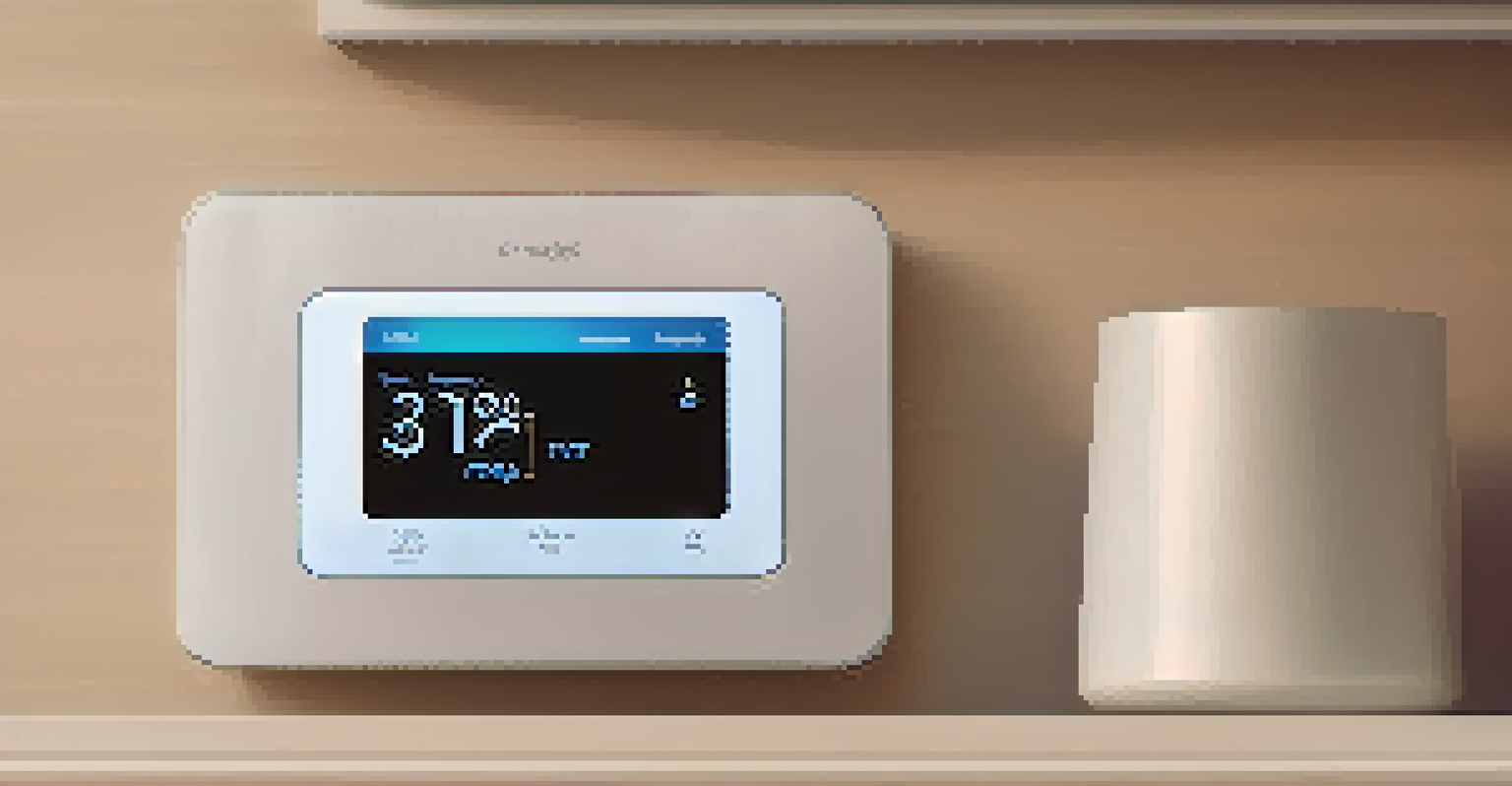Energy-Efficient Heating Solutions for Modern Homes

Understanding Energy Efficiency in Heating Systems
Energy efficiency in heating systems means maximizing warmth while minimizing energy use. This concept is crucial, especially as energy prices rise and environmental concerns grow. By choosing an energy-efficient system, homeowners not only save money but also reduce their carbon footprint, contributing to a healthier planet.
Energy efficiency is not just a goal; it's a necessity for our planet's future.
Many heating systems are rated based on their efficiency, often expressed in terms of Annual Fuel Utilization Efficiency (AFUE). This percentage reflects how much of the fuel is converted into usable heat. For example, a furnace with an AFUE of 90% uses 90% of its fuel for heating, which is a significant advantage over older models that may only reach 60%.
Incorporating energy efficiency into your home heating strategy not only enhances comfort but can also boost the value of your property. Homebuyers today are increasingly looking for energy-efficient features, making these systems a wise investment for the future.
Exploring Heat Pumps: A Versatile Solution
Heat pumps are an innovative heating solution that works by transferring heat rather than generating it. In the winter, they extract heat from the outside air or ground and bring it inside, while in the summer, they work in reverse. This dual functionality makes heat pumps a versatile choice for year-round comfort.

There are different types of heat pumps, including air-source, ground-source (or geothermal), and water-source systems. Air-source heat pumps are the most common and can be installed relatively easily. On the other hand, geothermal systems, while more expensive upfront, can offer substantial savings in the long run due to their efficiency.
Maximize Comfort with Energy Efficiency
Choosing energy-efficient heating systems not only saves money but also reduces your carbon footprint.
One of the major benefits of heat pumps is their low environmental impact. By using electricity to transfer heat instead of burning fossil fuels, they can significantly reduce greenhouse gas emissions, making them an eco-friendly choice for modern homes.
Radiant Floor Heating: Comfort Underfoot
Radiant floor heating is a hidden gem in energy-efficient heating solutions. This system involves installing heating elements beneath the floor, allowing warmth to rise evenly throughout the room. Imagine stepping onto a warm floor on a chilly morning; it’s a cozy experience that many homeowners cherish.
The sun is the most powerful energy source available, and its potential is vast and largely untapped.
There are two main types of radiant floor heating: electric and hydronic. Electric systems use heating cables, while hydronic systems circulate warm water through tubing. Both options provide consistent warmth and can be more efficient than traditional radiators, which often leave cold spots in a room.
Additionally, radiant floor heating can improve indoor air quality since it doesn’t rely on blowing air around, which can stir up dust and allergens. This makes it an excellent choice for those with allergies or respiratory issues, creating a healthier living environment.
The Benefits of Smart Thermostats
Smart thermostats have revolutionized how we manage our home heating. These devices learn your schedule and preferences, allowing for more precise temperature control. For instance, they can automatically lower the heat when you’re away and warm up the house before you return, ensuring comfort without wasting energy.
Many smart thermostats can be controlled remotely via smartphone apps, providing convenience and flexibility. This means you can adjust your home’s temperature from anywhere, whether you’re at work or on vacation. Such features not only enhance comfort but also help you monitor and reduce energy consumption.
Smart Thermostats Enhance Control
Smart thermostats allow for precise temperature management, improving comfort while reducing energy waste.
Moreover, integrating a smart thermostat with other smart home devices can lead to even greater energy savings. For example, pairing it with smart blinds can optimize sunlight exposure, further reducing the need for heating during sunny days.
Choosing the Right Insulation for Your Home
Proper insulation is crucial for maintaining energy efficiency in any heating system. Insulation acts as a barrier, preventing heat from escaping during the winter and keeping cool air inside during the summer. This means that no matter what heating solution you choose, good insulation will enhance its effectiveness.
There are various types of insulation materials, including fiberglass, foam, and cellulose. Each has its own benefits and drawbacks regarding cost, effectiveness, and installation. For instance, spray foam insulation provides an excellent air seal but can be more expensive upfront compared to traditional fiberglass batts.
Investing in quality insulation can yield significant savings on energy bills. In fact, sealing air leaks and properly insulating your home can improve overall energy efficiency by up to 20%, making it a vital step in any energy-efficient heating strategy.
Utilizing Solar Heating Systems
Solar heating systems harness the sun's energy to warm your home, making them an eco-friendly choice for environmentally conscious homeowners. These systems can be used to heat water, which can then be circulated through radiators or underfloor heating systems, or to directly warm the air in your living spaces.
Solar thermal collectors, typically installed on rooftops, absorb sunlight and convert it into heat. This renewable energy source not only reduces dependence on fossil fuels but can also lead to substantial savings on heating costs over time. Plus, many regions offer incentives for installing solar systems, making them more financially accessible.
Regular Maintenance Boosts Efficiency
Routine maintenance ensures your heating system runs optimally, extending its lifespan and saving on energy bills.
However, it's essential to consider your home’s location and climate when investing in solar heating. While they work best in sunny areas, advancements in technology have made them more effective even in less-than-ideal conditions, ensuring that solar heating is a viable option for many homeowners.
The Role of Regular Maintenance in Heating Efficiency
Regular maintenance is key to keeping your heating system running efficiently. Just like a car needs regular oil changes and tune-ups, your heating system requires attention to ensure it operates at peak performance. Scheduling annual inspections can help identify potential issues before they become costly repairs.
During maintenance visits, technicians can clean and inspect components, replace air filters, and ensure that everything is functioning as it should. This proactive approach not only extends the lifespan of your heating system but also maximizes energy efficiency, saving you money on your utility bills.

Additionally, maintaining your heating system can improve safety. For instance, gas-powered units require regular checks for leaks or malfunctions, ensuring that your home remains a safe and comfortable haven during the colder months.